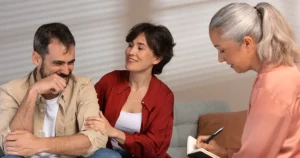Did you know that childhood trauma can significantly affect adult relationships? In fact, research shows that individuals who experienced abuse, neglect, or emotional turmoil in their early years often struggle with relationship issues later in life, including trust issues, communication barriers, and emotional regulation difficulties.
If you’ve ever wondered why certain behaviors or emotional responses in your relationship seem disproportionate to the situation, it could be due to early-life trauma. This trauma often manifests in adult romantic relationships, where unresolved childhood experiences influence behavior, communication, and emotional regulation.
However, there is hope as Couples Therapy offers an opportunity to address these wounds, heal, and build a stronger, more resilient partnership. By understanding the underlying trauma and working together to process it, couples can heal and strengthen their relationship bonds.
Understanding the Impact of Childhood Trauma on Adult Relationships:
Defining Childhood Trauma:
Childhood trauma refers to negative, often distressing experiences during childhood that have lasting effects on an individual’s mental health and relationships. This can include:
- Abuse: Physical, emotional, or sexual abuse during childhood can have long-lasting emotional consequences.
- Neglect: The absence of care, love, or attention, or being left emotionally or physically unsupported by caregivers.
- Witnessing Domestic Violence: Being exposed to violence or conflict in the household can affect a child’s sense of safety and security, often carrying over into adulthood.
These experiences can shape how individuals view themselves, others, and the world around them, leading to emotional and psychological challenges that continue well into adulthood.
Manifestations in Adult Relationships:
When childhood trauma is not processed or healed, it can manifest in adult relationships in various ways, creating significant challenges for both partners. Here are some common manifestations:
- Trust Issues
Individuals who have experienced betrayal, abandonment, or abuse in childhood often struggle to trust their partners. They may find it difficult to believe that their partner won’t hurt, deceive, or abandon them, even if there is no evidence to suggest this. - Communication Barriers
People who have been raised in environments where open communication was not encouraged or where emotions were not expressed in healthy ways may struggle with communication in their adult relationships. This often leads to difficulties in expressing feelings, needs, and concerns, causing frustration and misunderstandings. - Emotional Regulation Difficulties
Early trauma can make it hard for individuals to regulate their emotions. As a result, they may experience extreme emotional reactions, such as sudden outbursts of anger, anxiety, or sadness, which can lead to conflicts in the relationship.
Identifying Trauma vs. Relationship or Behavioral Issues:
Recognizing whether a relationship struggle stems from unresolved trauma or is simply a relationship issue can be challenging. Here are some self-reflection questions and methods that can help:
- Self-Reflection Questions:
- Are my emotional reactions to certain situations disproportionate to what’s actually happening?
- Do certain triggers consistently lead to strong emotional responses or reactions, like anxiety or anger?
- Patterns Recognition:
Identifying recurring negative patterns in your relationship can help pinpoint whether trauma is playing a role. For example, if you consistently have difficulty trusting your partner or withdrawing during emotional conversations, these may be symptoms of unresolved trauma. - Physical and Emotional Responses:
Certain physical symptoms, such as unexplained anxiety, anger, or emotional withdrawal, could be signs that trauma is affecting your relationship. If you notice that these feelings are disproportionate to the actual situation, trauma may be contributing to the emotional intensity.
The Role of Couples Therapy in Healing:
Creating a Safe Space:
One of the core aspects of Couples Therapy is the creation of a safe, non-judgmental environment where both partners can express their vulnerabilities. A skilled therapist provides a space for open communication and emotional exploration, helping couples address relationship issues caused by deep-seated problems related to past trauma in a healthy and supportive way.
Therapists work with both partners to identify the impact of early-life trauma on their relationship, helping them understand the behaviors, emotions, and patterns that stem from those experiences. Through this process, couples can rebuild trust and foster empathy toward one another.
Therapeutic Techniques:
Therapists use a variety of techniques to help couples process trauma and rebuild their relationship:
- Emotionally Focused Therapy (EFT): This therapeutic approach helps couples understand their emotional responses and restructure these reactions to enhance connection. EFT fosters empathy, which helps partners feel heard and understood, allowing them to express their needs in a way that strengthens the relationship.
- Trauma-Informed Cognitive Behavioral Therapy (CBT): CBT is used to address negative thought patterns that have developed due to trauma. It helps individuals and couples recognize and reframe harmful beliefs, such as feeling unworthy or unlovable, to healthier and more empowering thoughts.
Rebuilding Trust and Intimacy:
Rebuilding trust and intimacy after childhood trauma often requires specific therapeutic exercises that encourage vulnerability and emotional connection. These may include:
- Trust-Building Dialogues: These exercises involve open, honest conversations where partners are encouraged to listen actively and share their concerns without fear of judgment.
- Shared Activities: Engaging in bonding activities, such as spending quality time together or learning new skills, can help foster emotional closeness and rebuild trust.
Practical Strategies for Partners Beyond Therapy:
While Couples Therapy provides a powerful foundation for healing, it’s important to continue the work outside of therapy. Here are a few strategies to maintain and build a healthy relationship:
Enhancing Emotional Awareness:
- Mindfulness Practices: Mindfulness techniques, such as deep breathing exercises and meditation, can help partners stay attuned to each other’s emotions. Practicing mindfulness encourages emotional regulation and promotes a sense of presence in the relationship.
- Emotional Check-Ins: Set aside regular times to discuss your feelings and experiences without judgment. This allows couples to stay connected emotionally and avoid letting misunderstandings build up.
Improving Communication:
- Active Listening: Practice listening to your partner without interrupting and reflecting back what you hear to ensure mutual understanding.
- Using “I” Statements: Encourage using “I” statements that express your emotions without placing blame. For example, “I feel hurt when…” instead of “You always…”
Building Trust:
- Consistency: Rebuilding trust takes time. Keep promises and be reliable to reassure your partner that they can depend on you.
- Transparency: Openness about your thoughts, feelings, and actions helps build transparency and trust. Sharing your daily activities and being open about your feelings can reduce suspicion and emotional distance.
Alternative Supportive Practices:
Individual Self-Care:
Each partner should prioritize their own well-being to be emotionally available to each other. Activities such as exercise, hobbies, and spending time with friends can reduce stress, improve emotional health, and promote overall well-being.
Educational Workshops:
Attending workshops or seminars that focus on trauma recovery, communication skills, and relationship-building can help couples gain valuable insights and practical tools for improving their relationship.
Support Groups:
Support groups provide a sense of community and shared learning. Connecting with others who face similar challenges can help couples feel less isolated and more supported.
Conclusion:
Early-life trauma can deeply impact adult relationships, creating difficulties with trust, communication, and emotional regulation. However, Couples Therapy offers a safe and effective way to heal these wounds.
Through therapies such as Emotionally Focused Therapy (EFT) and Trauma-Informed Cognitive Behavioral Therapy (CBT), couples can rebuild their connection, regain trust, and develop a more resilient, loving partnership.
If you and your partner are struggling with the effects of childhood trauma on your relationship, Couples Therapy in Mississauga can help you heal and move forward. Take the first step today by reaching out to Nurturing Wellness for a Couples Therapy session. Together, you can rebuild trust, improve communication, and create a stronger, healthier bond.
Don’t wait to start healing. Book Session at Nurturing Wellness today to schedule your Couples Therapy session and begin your journey toward a more connected, fulfilling relationship.





